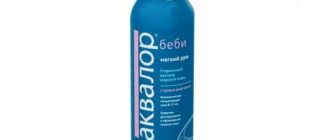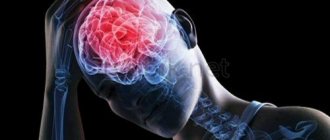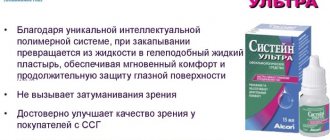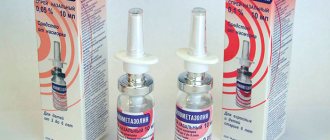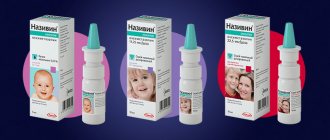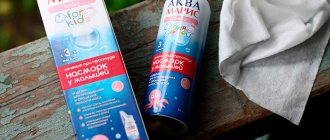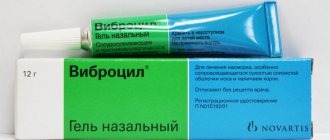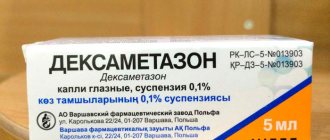- November 14, 2018
- Pulmonology
- Oskina Oksana Valentinovna
With various types of runny nose, colds and allergic diseases, serious discomfort is caused by swelling of the nasal mucosa, which leads to difficulty breathing. This slows down recovery and greatly worsens the patient's condition. In this case, it is recommended to use local drugs with a vasoconstrictor effect. One of the most popular is the “Dlyanos” spray. It is available in a convenient form, which makes the drug easier to use. And its simple composition makes it accessible to every patient.
Description
The main drug is xymetazoline hydrochloride, a substance with a pronounced alpha-adrenergic effect. In its structure and action, the drug is similar to Naphthyzin.
For the Nose, it quickly constricts the vessels of the nasal mucosa, temporarily eliminates swelling and helps reduce mucus secretion. Significantly facilitates breathing and frees up the nasal passages for the use of other medications. The primary effect after instillation is observed two minutes after administration and lasts for four hours.
During use, the drug acts only at the local level, practically without entering the blood: modern diagnostic methods have not been able to determine the presence of traces of the active substance in the plasma after use. For the nose, it practically does not cause irritation to the mucous membranes if you adhere to the recommended dosage and time of use of the drops.
Indications for use
For Nos is most often used to neutralize symptoms, one way or another associated with rhinitis of various etiologies. In addition, the drug is effective as a drainage agent for various problems with the sinuses (sinusitis, sinusitis, etc.).
As an adjuvant, ForNos is used in the drug therapy of otitis media as a means to reduce swelling, as well as before diagnostic procedures during rhinoscopy.
Instructions for use
For Nos it is used exclusively intranasally. Before using the drug, shake the flask with drops or press the spray dispenser several times to ensure complete release of the drug from the container. Before instillation, it is recommended to clear the nose of secretions as much as possible.
Children over six years of age and adults are usually prescribed two drops into both nasal passages every six hours. Children under six years of age cannot use a drug with a concentration of the active substance of 0.1 percent - in this case, a 0.05 percent solution of DlyaNos with a similar dosage is used. The maximum duration of a continuous course of symptomatic treatment with the drug should not exceed five days: after this period, the effectiveness of the drug is significantly reduced and the reverse process may occur - the so-called medicinal rhinitis.
In the case of a spray, it is recommended to do 2 injections into each nasal passage, no more than 3 times a day. Also, the drug should not be used for more than 7 days in a row.
Side effects and contraindications
In most cases, ForNos is well tolerated by patients. In some cases, hyperemia, irritation of the mucous membranes, dizziness, nausea and other similar manifestations are observed.
In isolated cases or in case of violation of the dosage/time limits for use, sleep disturbances, allergic reactions of the systemic spectrum, arterial hypertension, arrhythmia, confusion, tachycardia, shortness of breath, as well as neurotic edema with decreased visual acuity may be observed.
ForNos cannot be used together with tricyclic antidepressants and MAO inhibitors
The drug is prescribed with caution to people with diabetes mellitus, angina pectoris, hyperthyroidism, prostate hyperplasia, as well as pregnant, nursing mothers and children under two years of age.
The drug is contraindicated in patients with glaucoma, people who have undergone brain surgery with exposure of the meninges, as well as those with a medical history. Also, drops are contraindicated for those who have a personal intolerance to xymetazoline hydrochloride or individual components of the nasal drug.
For nose during pregnancy
During pregnancy, the drug DlyaNos can be used with caution, only after permission and under the supervision of a doctor. Short-term use of the drug is allowed in case of urgent need. It is better for lactating women to refuse breastfeeding or not to use the drug, since there is no data on the possibility of xylometazoline hydrochloride passing into breast milk.
For nose for children
The drug in any dosage is contraindicated for babies under three months. Children from three months to six months can use DlyaNos at a dosage of 0.05 percent of the active substance in solution. Children from six years of age and adolescents can use the usual dosage of the drug - 0.1 percent.
The best alternative for children and pregnant women is to use a nebulizer for a runny nose.
Video about the drug
"Isofra"
The most commonly prescribed spray for rhinitis. This is a prescription medication that is intended for children from one year of age and adult patients. "Isofra" has a powerful bactericidal effect.
The drug is prescribed as part of combination therapy for otitis media, as well as inflammation of the maxillary sinuses and other lesions of the upper respiratory organs - runny nose, sinusitis, nasopharyngitis. Restrictions for use include increased sensitivity to the substances of the drug.
Dosing the medicine involves a seven-day course of one irrigation. For young patients, it is enough to use the drug two to three times a day, for adult patients – three times a day.
In the responses, patients mention instant help with congestion, rhinitis, and even advanced sinusitis. What other names are prescribed for nasal drops for sinusitis? List of medications:
Names of steroid nasal drops:
Indications for use
Most often, DLYANOS is used in the treatment of infectious rhinitis. Drops almost instantly eliminate swelling of the mucous membrane and reduce the amount of discharge. This spray is great for eliminating the symptoms of a runny nose with severe nasal congestion.
Instructions for use recommend using the drug in complex therapy of sinusitis. After all, good drainage of the sinuses is so important for recovery. The outflow of pus and fluid is enhanced only by the action of vasoconstrictor drugs.
Spray FORNOS is used for allergies. These drops can be used for a short course in case of hay fever, hay fever and other types of hypersensitivity. Xylometazoline provides temporary relief of symptoms but is not suitable for chronic use.
In addition, the medicine is recommended to be instilled into the nose for inflammation of the middle ear. During eustachitis, the drug will bring rapid improvement, and during otitis media it will reduce the progression of symptoms.
Spray FORNOS causes a sharp narrowing of the capillaries of the nasal cavity. This phenomenon can be useful when performing diagnostic ENT manipulations. Instructions for use recommend using drops in preparation for examinations and operations.
"Sialor Protargol"
You may be interested in: Blood thinner tablets without Aspirin: a list of effective drugs
The medication is prescribed for a runny nose and otitis media, as it has an antiseptic and astringent effect. The main feature of the drug is the inclusion of silver proteinate in the structure, which ensures increased effectiveness of the drug in the treatment and prevention of diseases.
The nasal spray cannot be used during an “interesting position” and breastfeeding, as well as if you are individually intolerant to Sialora substances.
Side effects when treating a child with Dlynos
dangerous Frequent use may cause sneezing, irritation, dryness, burning, and tingling in the nose.
Using Dlynos, like its analogues, for longer than 5-7 days can be addictive. This is due to the fact that vasoconstrictor drops and sprays are “descendants” of adrenaline. Long-term exposure to these drugs leads to the fact that the nasal mucosa no longer contracts without their use, and the vessels do not respond to the natural concentrations of adrenaline in the blood, which leads to constant nasal congestion.
It is also undesirable to use Dlyanos and other vasoconstrictors in the treatment of allergic rhinitis, as they make the mucous membrane more sensitive to histamine, which entails an increase in allergic reactions.
"Afrin"
The nasal spray is produced in a volume of seventy-five milliliters. This medicine is suitable for daily care of the nasal cavity, is used during viral and bacterial diseases, and makes breathing easier. Doctors recommend this medication for rhinitis and congestion, as well as allergies and otitis media.
Patients confirm that after using the medicine, nasal congestion significantly decreases and breathing becomes easier. "Afrin" effectively cleanses the mucous membrane, eliminating pathological secretions. In addition, the medication protects against colds and allergic diseases, acting as a preventive measure. The vast majority of people noted the safety of the drug.
For nose instructions
1 ml of the drug, which is a colorless, transparent substance (solution), odorless, contains: xylometazoline hydrochloride - 0.5 mg (drops), xylometazoline hydrochloride - 1 mg (spray). The composition includes excipients:
- sodium dihydrogen phosphate dihydrate,
- edetate disodium,
- benzalkonium chloride,
- sodium dodecahydrate hydrogen phosphate,
- sodium chloride,
- distilled water.
Xylometazoline, which is part of the drug, is a local vasoconstrictor with adrenomimetic properties. By narrowing the blood vessels of the nasal membrane, swelling of the nasal and pharyngeal mucosa and hyperemia are reduced. The drug is used to eliminate symptoms characteristic of acute respiratory diseases, as well as those manifested by a runny nose (rhinitis). The drug begins to act in approximately 2-3 minutes, its effect ends after ten hours.
Side effects
The World Health Organization has created a special classification that reflects the frequency of adverse reactions in the body from a particular drug:
- up to 0.1 – very often
- up to 0.01 – often;
- from 0.001 to 0.01 – infrequently;
- up to 0.0001 – rare;
- isolated cases are very rare.
When using the medicine for the common cold, Fornos, some negative reactions from the body were identified.
The spray and drops contain instructions for use, which clearly describe possible complications:
- From the immune system: urticaria, angioedema, itching, rash are very rare.
- Neuropsychiatric disorders: a common sign of a drug overdose is headache, rarely - depressive states, sleep disturbances.
- Cardiovascular system disorders: rarely develops increased heart rate and increased blood pressure, very rarely - arrhythmia.
- On the part of the respiratory system: drying of the nasal mucosa and its irritation are often observed, burning, sneezing, and increased secretion of secretions by the nasopharyngeal epithelium appear.
- Local reactions: use of the drug Dlyanos is often accompanied by a feeling of burning and tingling.
- Manifestations of gastrointestinal disorders: often the patient may feel nausea, rarely vomiting.
To avoid the development of unpleasant complications, Fornos should be used according to the instructions and only after prior consultation with a doctor. The effectiveness of the active substance allows you to eliminate signs of nasal congestion for a period of up to 12 hours and restore breathing.
Instructions for use
Active ingredients
Xylometazoline
Release form
Spray
Compound
1 ml of the drug contains Active ingredient: Nasal spray - xylometazoline hydrochloride 1 mg. Excipients: benzalkonium chloride, sodium dihydrogen phosphate dihydrate, sodium hydrogen phosphate dodecahydrate, disodium edetate, sodium chloride, distilled water.
Pharmacological effect
Xylometazoline belongs to the group of local vasoconstrictors (decongestants) with a-adrenomimetic action. Xylometazoline causes constriction of the blood vessels of the nasal mucosa, thus eliminating swelling and hyperemia of the nasopharyngeal mucosa. The drug facilitates nasal breathing with rhinitis (runny nose). In therapeutic concentrations it does not irritate the mucous membranes and does not cause hyperemia. The action begins within a few minutes and lasts up to 10 hours.
Pharmacokinetics
When applied topically, it is practically not absorbed; plasma concentrations are so small that they cannot be determined by modern analytical methods.
Indications
Acute respiratory diseases with symptoms of rhinitis (runny nose), acute allergic rhinitis, hay fever, sinusitis, eustachitis, otitis media (to reduce swelling of the nasopharyngeal mucosa). Preparing the patient for diagnostic manipulations in the nasal passages.
Contraindications
Hypersensitivity to the components of the drug, arterial hypertension, tachycardia, severe atherosclerosis, glaucoma, atrophic rhinitis, hyperthyroidism, surgical interventions on the meninges (history), pregnancy, children under 6 years of age (for nasal spray 0.1%). With caution – diabetes mellitus, prostatic hyperplasia, children under 2 years of age (for nasal drops 0.05%).
Use during pregnancy and breastfeeding
The drug should not be used during pregnancy. During lactation, the drug should be used with caution. The drug should be used only after a careful assessment of the risk-benefit ratio for the mother and fetus. Do not exceed the recommended dosage. Method of administration and dosage Intranasal. Nasal spray 0.1% is prescribed to adults and children over 6 years of age: 1 spray from a sprayer into each nasal passage (can be repeated if necessary), usually 3-4 injections per day are enough. To make the injection correctly, you should hold the sprayer vertically, so that the nozzle is directed upward. Then you should place the nozzle in the nasal passage, quickly and sharply press once on the sprayer and remove the nozzle without unclenching the sprayer. During injection, you should inhale a little air through your nose, which promotes optimal administration of the drug.
Side effects
With frequent and/or prolonged use - irritation and/or dryness of the mucous membrane of the nasopharynx, burning, tingling, sneezing, hypersecretion of mucus. Rarely - swelling of the nasal mucosa, palpitations, tachycardia, arrhythmias, increased blood pressure, headache, vomiting, insomnia, visual impairment, systemic allergic reactions; depression (with long-term use of high doses).
Indications and contraindications
Dlynos can be used for any diseases in children and adults that cause a runny nose. The medication is widely prescribed in the following cases:
- otitis;
- eustachitis;
- different types of rhinitis and sinusitis;
- nasal congestion;
- pain in acute rhinitis.
The drug can increase the effectiveness of nasal irrigations. Sometimes a capillary constrictor is used for diagnostic purposes.
Attention! If, after injection, babies continue to have congestion in the nasal passages and have problems sleeping, the cause of this condition may be the growth of the adenoids. . Despite the high effectiveness of this remedy, there are a number of contraindications to it.
Among them are the following conditions:
Despite the high effectiveness of this remedy, there are a number of contraindications to it. Among them are the following conditions:
- arterial hypertension;
- hyperthyroidism;
- cardiopalmus;
- atrophic rhinitis;
- during surgical interventions on the brain.
Also, Dlynos is not prescribed if the patient’s immune system is intolerant to the components of the medication.
An aerosol of 0.1% is used for children over 6 years of age, and drops of 0.05% are indicated for children under 2 years of age.
"Sanorin"
The drug belongs to the therapeutic group of alpha-adrenergic agonists for local use. "Sanorin" is used to reduce the manifestations of rhinitis and nasal congestion.
The indication for the use of the medicine is considered to be relief of breathing for rhinitis of various etiologies, as well as for frontal sinusitis and sinusitis. In addition, Sanorin is used to stop nosebleeds and to prepare the mucous membrane of the nasal cavity before rhinoscopy.
There are several conditions of the body in which the drug cannot be used:
Before using the drug, you should make sure that there are no restrictions. Dosage regimen:
Indications and contraindications for the drug
Such vasoconstrictor drops can be used for any condition of the child’s body that causes nasal congestion. Children's Dlya Nose is used to eliminate otitis media, hay fever, eustachitis, various types of rhinitis and sinusitis.
In addition, the attached instructions advise using Dlynos in the following cases:
- the need to relieve the child of discomfort caused by nasal congestion;
- elimination of pain syndrome in acute otitis media;
- increasing the efficiency of rinsing the nasal cavity.
In some cases, vasoconstrictor drops can be used for diagnostic purposes. If, after using such a remedy, children continue to have nasal congestion and have problems sleeping, then the cause of the pathological condition of the body may not be a runny nose, but an enlargement of the adenoids.
Despite the high effectiveness of this drug, there are some contraindications to its use. You will have to refuse to treat nasal congestion with these drops:
- with arterial hypertension;
- with atrophic rhinitis;
- with hyperthyroidism;
- with tachycardia;
- during surgical interventions on the brain and its membranes.
In addition, the use of such a drug should be abandoned if the child’s body is hypersensitive and intolerant to individual components of the drug.
It should be remembered that nasal spray 0.1% is allowed to be used only after 6 years of age, and at the age of 2 years, nasal drops 0.05% should be used with caution.
"Rinostop"
Nasal drops are very often used for rhinitis, as well as otitis media, allergic manifestations and in preparation for diagnosing the nasal passages. The annotation states that the drug is intended for both children and adults. But it is worth paying attention that the permissible age is from two years.
According to the instructions for use, it is known that “Rinostop” has a vasoconstrictor effect, effectively eliminates swelling, and eliminates nasal congestion.
Excessive sensitivity to the active ingredient is not the only limitation. Therefore, you should carefully study the list of contraindications before purchasing the drug. Dosage – one or two drops twice a day. Patients in their responses say that thanks to “Rinostop” children’s breathing becomes freer.
Side effects
Typically, the use of the drug Dlynos is well tolerated by the child’s body, but in rare cases side effects may occur:
- dizziness;
- attacks of nausea;
- hyperemia;
- irritation of the mucous membrane.
It is important to remember that you must use the drug after reading the attached instructions and strictly follow the indicated dosages. This is due to the fact that violation of the dosage of the drug can cause sleep problems and the development of allergic reactions.
It is important to remember that using the vasoconstrictor Dlynos and their analogues is not recommended for more than 5-7 days, as this can cause addiction to the drug. Taking such a remedy for a long time can lead to the fact that the nasal mucosa will stop contracting without such drops. In addition, the blood vessels stop responding to the natural level of adrenaline in the blood, and this becomes the cause of constant nasal congestion.
It is not recommended to use Dlynos and other vasoconstrictor drugs in the treatment of pathologies such as allergic rhinitis. This is due to the fact that the use of such drugs makes the nasal mucosa more sensitive to histamine, which can intensify the manifestation of an allergic reaction.
A runny nose is an unpleasant pathological condition of the body, and causes a lot of discomfort to young children. Rhinitis must be treated, since its progression can lead to the development of complications such as otitis media, laryngitis and bronchitis. Fornos is considered one of the effective vasoconstrictor drugs in the fight against the runny nose, but it must be used in accordance with the instructions.
"Flixonase"
The drug is a glucocorticosteroid for nasal use. The medicine is prescribed for the treatment and prevention of seasonal and allergic rhinitis. Sometimes Flixonase is prescribed to eliminate adenoiditis.
Like any medicine, the spray has a number of contraindications for use, so you should read the instructions before treatment. The spray is not recommended for use in the presence of one or more conditions:
- children under six years of age;
- individual intolerance;
- pregnancy;
- lactation.
Infectious and inflammatory lesions of the nasal cavity are considered relative restrictions on the use of the drug.
When the drug should not be used
Medicines for the common cold are allowed to be sold over-the-counter from pharmacies. However, it should be remembered that these drugs have strict contraindications. In some cases it is dangerous to use them. We list the groups of people for whom nose sprays are prohibited:
- hypertensive patients. If a systemic effect occurs, patients may experience a sharp rise in blood pressure;
- patients with glaucoma. Medicines cause increased intraocular pressure;
- patients with atrophic rhinitis. Vasoconstrictor drugs are not suitable for the treatment of such a runny nose. They cause additional drying of the nasal membrane;
- persons with hyperthyroidism. The systemic effect of drops may cause increased blood pressure or arrhythmia;
- pregnant women. Only low concentrations of solutions are used.
In these cases, using the drug is strictly prohibited.
Caution should be exercised when prescribing the medicine to persons suffering from diabetes mellitus and prostate adenoma.
In pediatrics, age-specific dosages of xylometazoline are used. For small children, concentrations of 0.05% are used. The medicine in the form of a 0.1% spray can only be used after 6 years.
"Snoop"
This nasal spray is one of the most effective vasoconstrictor drugs. “Snoop” eliminates swelling, hyperemia, and helps restore patency. Patients note relief in nasal breathing, as well as a good duration of action.
According to the annotation, it is known that indications for use of the spray:
A significant disadvantage is a large list of contraindications:
Dosing is the same - one irrigation up to three times a day. The duration of therapy should not exceed a week.
Nasal drops, list of names:
Basic rules for using nasal drops
A runny nose can be caused by various reasons. Regardless of them, there are rules for using nasal drops:
- Stage 1 – cleansing;
- Stage 2 – instillation.
Cleansing
Before using Dlynos drops, it is recommended to cleanse the nasal passages of secretions. It is necessary to drip sea water or saline solution into the nose. This will thin the mucus and make it easier to pass. Afterwards you should blow your nose well. It is recommended to use a nasal aspirator to remove mucus from your child's nose.
Burying
If the drug is stored in the refrigerator, it is recommended to warm it up slightly before use. To do this, place the pipette with the medicine in warm water for a few seconds. Drops for a runny nose are instilled in a vertical position.
Precautionary measures
Do not use for more than 7 days in a row: prolonged or excessive use may cause increased mucus secretion and swelling of the mucous membrane. Do not exceed recommended doses.
Use with caution in patients with hypersensitivity to sympathomimetics, which is manifested by symptoms such as insomnia, dizziness, tremor, cardiac arrhythmia and high blood pressure. . Should be used with caution in patients with hypertension, cardiovascular disease, hyperthyroidism, diabetes mellitus
It should be used with caution in patients with hypertension, cardiovascular diseases, hyperthyroidism, and diabetes mellitus.
"Polydex"
Vasoconstrictor medication with antimicrobial and anti-inflammatory effects for local use in otorhinolaryngological practice.
"Polydex" quickly eliminates swelling of the mucous membrane and has an anti-inflammatory effect. In addition, Polidexa narrows the capillaries of the nose, making breathing easier, and has a detrimental effect on pathogenic microflora of gram-negative and gram-positive etiology.
The drug perfectly eliminates inflammatory diseases of the nasal cavity and sinuses, does not provoke withdrawal symptoms and is perfectly combined with broad-spectrum oral antibacterial agents. What other names for hormonal nasal drops exist?
Peculiarities
So, to summarize, we can highlight the following features of this drug:
- The main pharmacologically active substance in Dlyanos is xylometazoline, which belongs to the class of alpha-adrenomimetic drugs.
- The mechanism of action is to constrict the vessels of the nasal mucosa and relieve swelling.
- The main indication for use is rhinitis of any etiology.
- Use occurs in the form of 0.1% nasal spray and 0.05% nasal drops.
- The drug should not be used simultaneously with monoamine oxidase inhibitors and antidepressants.
- In addition to the list of indications for this substance, there are a number of contraindications and side effects, the neglect of which is unacceptable.
- Symptoms of overdose may occur with frequent use of the drug.
- There is a wide range of similar products in relation to “Dlyanos” with the same active ingredient in the composition.
- Reviews about the drug are of a twofold nature, which is due to the characteristics of the body and its reaction to medications in absolutely every person.
Description
The main drug is xymetazoline hydrochloride, a substance with a pronounced alpha-adrenergic effect. In its structure and action, the drug is similar to Naphthyzin.
For the Nose, it quickly constricts the vessels of the nasal mucosa, temporarily eliminates swelling and helps reduce mucus secretion. Significantly facilitates breathing and frees up the nasal passages for the use of other medications. The primary effect after instillation is observed two minutes after administration and lasts for four hours.
During use, the drug acts only at the local level, practically without entering the blood: modern diagnostic methods have not been able to determine the presence of traces of the active substance in the plasma after use. For the nose, it practically does not cause irritation to the mucous membranes if you adhere to the recommended dosage and time of use of the drops.
Side effects
A typical occurrence of drug abuse is dry mucous membranes. This remedy for the common cold narrows the superficial vessels, therefore, the nutrition of the epithelium is disrupted. There is a burning sensation, tingling, and sneezing. The cells of the surface layer try to restore the disturbed balance by launching increased mucus production. Thus, we get the opposite effect from the treatment. Keep this in mind if you plan to use FORNOS for longer than 5 days.
Rarely, DLYANOS drops exhibit an undesirable systemic effect: blood pressure increases, arrhythmias appear, and vision is impaired. Sometimes patients suffer from headaches, vomiting and insomnia. Some people developed depression with prolonged misuse of the spray.
If you decide to choose this particular drug for the treatment of a runny nose, carefully read the instructions. When used correctly, these drops will allow you to forget about rhinitis and other nasopharyngeal diseases for several hours. In addition, I am pleased with the affordable price of the medicine. And the possibility of use in children allows you to include the solution in your home first aid kit.
Price, where to buy
The price for Dlynos drops varies between 72 - 82 rubles per package; the cost of the spray ranges from 92 to 180 rubles. You can purchase the drug in most pharmacies in Moscow and other cities.
Find the nearest pharmacies
- Online pharmacies in RussiaRussia
- Online pharmacies in UkraineUkraine
Europharm* 4% discount using promo code medside11
- For nose spray nasal 0.1% 10 mlSandoz Private Limited/for Novar98.9 rub.
- Nasal drops for nose 0.05% 10 ml Sandoz Private Limited 77.4 rub.
Pharmacy Dialogue* discount 100 rub. using promo code medside (for orders over 1000 rubles)
- For nose (spray 0.1% 10ml) 100 rub.
- For nose (drops 0.05% 10ml) 76 rub.
Pharmacy IFC
- For noseSandoz Private Ltd, India68.50 rub.
- For noseSandoz Private Ltd, India100.10 rub.
show more
Pharmacy24
- For nose 0.05% 10 ml drops Novartis Consumer Health S.A., Switzerland34.87 UAH.
PaniPharmacy
- Nasal liquid Nasal drops 0.05% 10ml India, Sandoz Private Limited37.97 UAH.
"Tizin"
The medicine is intended to eliminate signs of allergies. Nasal drops are a qualitative measure to combat seasonal and year-round runny noses that are of allergic origin - they reduce the amount of nasal discharge, eliminate sneezing, and neutralize itching.
Restrictions include pregnancy, age under six years, and excessive sensitivity to substances. Patients cite the advantage of being over-the-counter, as well as ease of use. The reviews consider the price to be high. Some people complain that the therapeutic effect of the drug does not last long.
Description of the drug Dlynos
The drug is indicated for symptomatic therapy for adults and children suffering from rhinitis of various natures. It helps stimulate the removal of mucus accumulations from the nasal passages. The components of Fornas relieve swelling of the epithelium, which is necessary before rhinoscopy.
The drug is made on the basis of xylometazoline hydrochloride, which is considered an element with alpha-adrenomimetic effects. Using drops you can get rid of tissue swelling, lower the temperature and reduce the amount of exudate produced. 5 minutes after administration, breathing becomes easier. The result lasts 10 hours. For the nose, it is well tolerated by patients, does not cause irritation and is not absorbed into the blood.
Analogs
Level 4 ATX code matches: Xymelin Eco
Xymelin
Nazivin
Galazolin
Lazorin
Nazivin Sensitive for children
Otrivin
Naphthyzin
Sanorin
Knoxprey
Lazolvan Rino
Afrin
Rhinorus
Eucazoline Aqua
Rinazolin
Grippostad Reno
Farmazolin
Xylometazoline
Nazol Advance
Nazol Baby
Grippostad Rino , Brizolin , Xylen , Galazolin , Xylometazoline hydrochloride , Dr. Theiss aerosol , Xylometazoline-Rusfar , Dr. Theiss Nazolin , K-Ratiopharm , Xymelin , Rinonorm , Nazenspray , Otrivin , Tizin xylo , Rinostop , Farmazolin .
